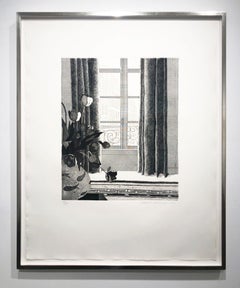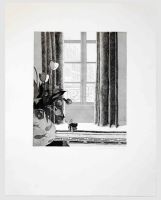David Hockney Rue De Seine
Recent Sales
1970s Post-War Prints and Multiples
Etching, Aquatint
Lithograph
Etching
David Hockney for sale on 1stDibs
The art of David Hockney is always engaging in its pleasant ambiguities: his prints, drawings and paintings are warm but somehow aloof; filled with light yet often dark and brooding in subject; simple, frank and mundane, but also ethereal and complex. The artist’s stature in the contemporary art world is such that, in a 2011 survey of one thousand British painters and sculptors, he was named the most influential British artist of all time.
Hockney grew up in Bradford, in the northern English county of Yorkshire, studying at the Bradford School of Art from 1953 to ’57, and at the Royal College of Art in London from 1959 to 1962. Though he was educated in art at a time when abstraction dominated the field, Hockney stuck resolutely to figurative painting and drawing.
Hockney's early paintings suggest a search for a style, veering from Expressionism to a grotesquerie suggestive of James Ensor. But Hockney found himself almost the moment he arrived in Los Angeles, in 1963. The move from the gray and rainy Britain to a world of bright sunshine and sparkling water brought Hockney a sense of freedom and an artistic epiphany. He would spend most of the next five years in L.A., painting luminous pictures, such as A Bigger Splash (1967), of things that made him happy: swimming pools, manicured lawns, palm trees, stucco buildings and luxuries like shower stalls. Hockney also painted people, almost always his friends. His California portraits such as Beverly Hills Housewife (1966) are considered to be his finest work. They are at once grandly scaled, intimate and poetic.
In the 1970s, Hockney moved back to Britain and spent much of his time on photography and printmaking. He returned to painting in the 1980s, and to subjects like still lifes, seascapes and portraits. Hockney has always been fascinated by the use of technology in art — he’s credited with inventing the technique of joining Polaroid photos in a collage to form a panoramic picture — and has been using the Brush app to paint on an iPad. Because he is prolific and works in a wide range of mediums, Hockney’s art is available at many price points. His consistently striking and provocative work should have a place in any comprehensive collection of contemporary art.
Find original David Hockney art on 1stDibs.
Finding the Right prints-works-on-paper for You
Decorating with fine art prints — whether they’re figurative prints, abstract prints or another variety — has always been a practical way of bringing a space to life as well as bringing works by an artist you love into your home.
Pursued in the 1960s and ’70s, largely by Pop artists drawn to its associations with mass production, advertising, packaging and seriality, as well as those challenging the primacy of the Abstract Expressionist brushstroke, printmaking was embraced in the 1980s by painters and conceptual artists ranging from David Salle and Elizabeth Murray to Adrian Piper and Sherrie Levine.
Printmaking is the transfer of an image from one surface to another. An artist takes a material like stone, metal, wood or wax, carves, incises, draws or otherwise marks it with an image, inks or paints it and then transfers the image to a piece of paper or other material.
Fine art prints are frequently confused with their more commercial counterparts. After all, our closest connection to the printed image is through mass-produced newspapers, magazines and books, and many people don’t realize that even though prints are editions, they start with an original image created by an artist with the intent of reproducing it in a small batch. Fine art prints are created in strictly limited editions — 20 or 30 or maybe 50 — and are always based on an image created specifically to be made into an edition.
Many people think of revered Dutch artist Rembrandt as a painter but may not know that he was a printmaker as well. His prints have been preserved in time along with the work of other celebrated printmakers such as Pablo Picasso, Salvador Dalí and Andy Warhol. These fine art prints are still highly sought after by collectors.
“It’s another tool in the artist’s toolbox, just like painting or sculpture or anything else that an artist uses in the service of mark making or expressing him- or herself,” says International Fine Print Dealers Association (IFPDA) vice president Betsy Senior, of New York’s Betsy Senior Fine Art, Inc.
Because artist’s editions tend to be more affordable and available than his or her unique works, they’re more accessible and can be a great opportunity to bring a variety of colors, textures and shapes into a space.
For tight corners, select small fine art prints as opposed to the oversized bold piece you’ll hang as a focal point in the dining area. But be careful not to choose something that is too big for your space. And feel free to lean into it if need be — not every work needs picture-hanging hooks. Leaning a larger fine art print against the wall behind a bookcase can add a stylish installation-type dynamic to your living room. (Read more about how to arrange wall art here.)
Find fine art prints for sale on 1stDibs today.

